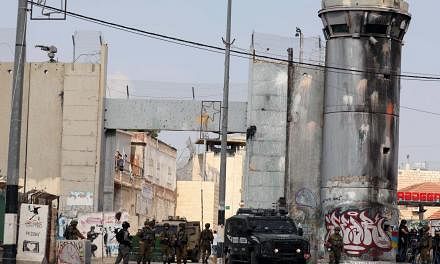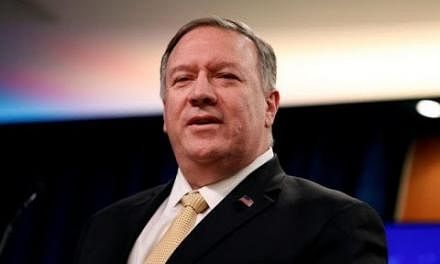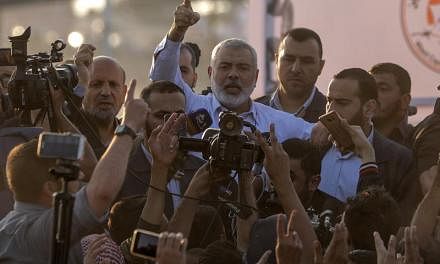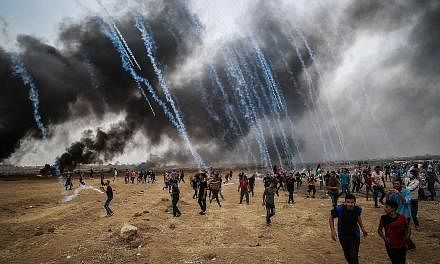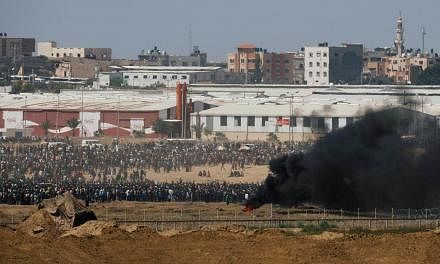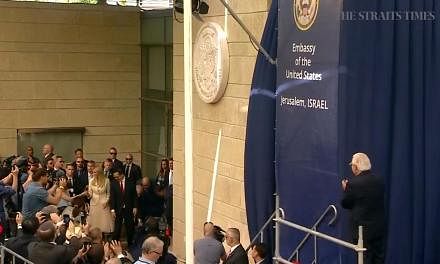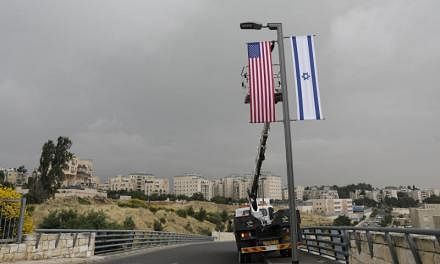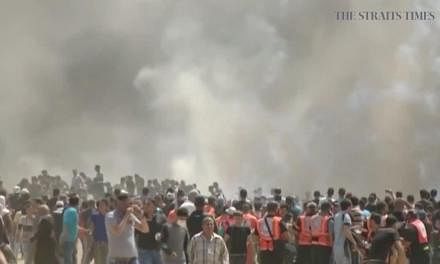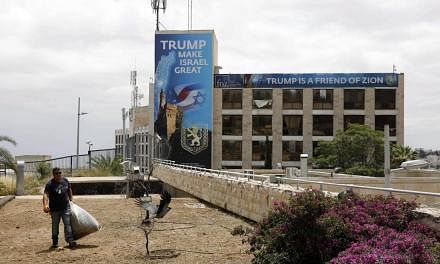GAZA CITY, PALESTINIAN TERRITORIES (REUTERS, AFP) - Israeli troops killed dozens of Palestinians taking part in mass protests on the Gaza border on Monday (May 14) as the United States opened its embassy to Israel in Jerusalem.
The US relocation of its embassy from Tel Aviv fulfilled a pledge by US President Donald Trump, who has recognised the holy city as the Israeli capital, but it has fired Palestinian anger and drawn criticism from many foreign governments as a setback to peace efforts.
At least 55, including eight children aged under 16, were shot dead by Israeli forces as clashes broke out at five points along the Gaza border hours before the opening of the embassy.
The death toll made it the deadliest day in the Israeli-Palestinian conflict since the 2014 Gaza war.
More than 2,700 Palestinians were wounded in the clashes, the health ministry in Gaza said, with the Palestinian Journalists' Syndicate saying eight journalists were among them.
The Israeli army said that more than 35,000 people were involved in the protests and clashes. It accused Gaza's Islamist rulers Hamas of leading a "terrorist operation under the cover of masses of people".
The Palestinian Authority government based in Ramallah, in the occupied West Bank, accused Israel of carrying out a "terrible massacre".
'LONG TIME COMING'
At 4.00pm (9pm Singapore time), the ceremony opening the US embassy in Jerusalem began with the US national anthem. Some 800 guests attended the ceremony.
In a video address, US President Donald Trump affirmed the status quo at Jerusalem holy sites and said the US was committed to facilitating a peace agreement. He also said the Jerusalem embassy move was "a long time coming".
Prime Minister Benjamin Netanyahu, in lockstep with Trump over fulfilling a long-standing US promise to move the embassy to the holy city and over Washington's withdrawal from the Iran nuclear deal last week, hailed the move.
"This is a great day. A great day for Jerusalem. A great day for the state of Israel. A day that will be engraved in our national memory for generations," Netanyahu said in a speech at the embassy's opening ceremony.
He thanked Trump for "having the courage" to keep his promise to move the embassy to Jerusalem from Tel Aviv. Netanyahu concluded his speech calling Jerusalem the"eternal, undivided capital of Israel."

US Deputy Secretary of State John Sullivan led the Washington delegation at the inauguration that also included Trump's daughter Ivanka and her husband Jared Kushner, both White House aides, as well as Treasury Secretary Steven Mnuchin.
UN Secretary-General Antonio Guterres said he was "deeply concerned" by the events in Gaza, while the European Union and France called for restraint.
French foreign minister Jean-Yves Le Drian said the US embassy move "violated international law and in particular UN Security Council resolutions".
Palestinian President Mahmoud Abbas's spokesman said the opening of the embassy in Jerusalem would create incitement and instability in the region and ruled out Washington as being a mediator for Middle East peace.
Jerusalem's status is perhaps the thorniest issue in the Israeli-Palestinian conflict. Israel considers the entire city its capital, while the Palestinians see east Jerusalem as the capital of their future state.
Palestinians threw stones, rolled burning tyres towards the border and tried to approach the fence to damage it and potentially break through, with Israeli snipers firing from the other side.
Bilal Fasayfes, 31, was getting on a free bus to the border with his wife and two children in the southern Gaza city of Khan Yunis.
"If half the people die we won't care," he said."We will keep going so the other half can live with dignity."
'REMOVE THE EMBASSY'
Israeli warplanes also struck a Hamas base close to the border, the army said, saying forces had come under fire.
The army also said it killed three Palestinians seeking to plant an explosive device.
Hamas leaders had backed attempts to break through the border fence during the protest.
The protests were against the transfer of the US embassy in Israel from Tel Aviv to the disputed city of Jerusalem.
Demonstrators are also calling for Palestinian refugees who fled or were expelled during the 1948 war surrounding Israel's creation to be allowed to return to their homes now inside Israel.
Palestinians have been infuriated by US President Donald Trump's Dec 6 recognition of Jerusalem as Israel's capital as they consider the eastern part of the city their capital.
More than 91 Palestinians have been killed by Israeli fire since protests and clashes began along the Gaza border on March 30.
No Israelis have been wounded and the military has faced criticism over the use of live fire.
Israel says it only opens fire when necessary to stop infiltrations, attacks and damage to the border fence, while accusing Hamas of seeking to use the protests as cover to carry out violence In Khan Yunis, groups of masked young men, some carrying wooden bats, walked between shops forcing them to close to respect a general strike.
Muataz al-Najjar, 18, who was wounded four times in the last seven weeks, once from a bullet and the others from gas cannisters, said he hoped to break through the fence.
"We will return and the move of the embassy from Tel Aviv will be prevented." East of Gaza City, Umm Saab Habib, 60, said she was taking part "to tell Trump to remove the embassy from Jerusalem and we are returning to Jerusalem".
At Shifa Hospital, where doctors say they are running low on crucial supplies and being forced to discharge patients early to make space for the next wave, a large tent was erected in front of the emergency room.
Faris Abu Hajaras, 50, said his family was from Jaffa, now within Israel, but he had never been there. He is a builder but said Israel's blockade of Gaza meant there was no work.
"We will stay peaceful with our hands like this," he said, lifting them to the sky.
"But death comes from God."


